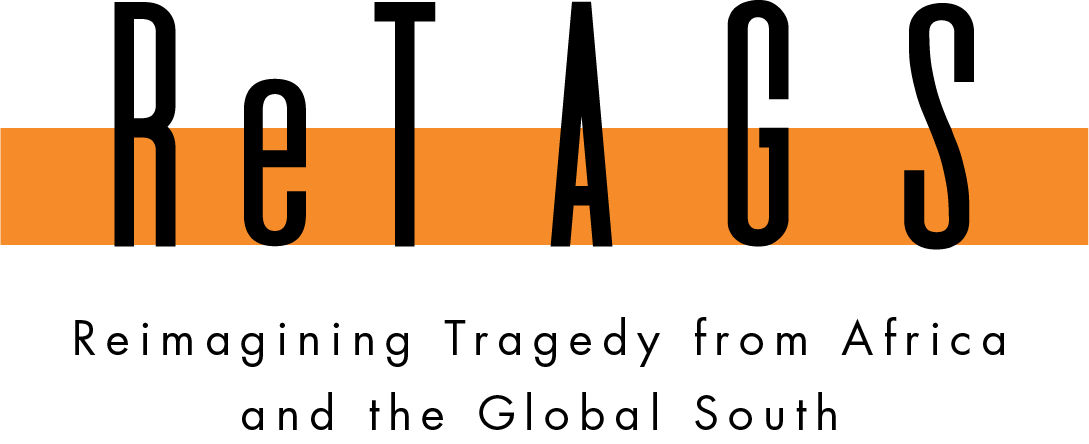Oral history interview with Onuoha Chukwuma Sunday
Title
Interviewee
Interviewer
Date Created
Recorded At
Duration
Capturer
Transcriber
Keywords
Language
Rights
Identifier
Onuoha Chukwuma Sunday
Olalekan Balogun
RETAGS
Saturday 05 October 2019
Transcribed by Jayne Batzofin
Balogun Okay, can you just introduce yourself?
Sunday Okay, my name is Onuoha Chukwuma Sunday. I'm an actor, a professional actor and that's what I do.
Balogun Okay, you have read the consent form that I just gave you.
Sunday Yeah.
Balogun Well just to paraphrase, this project is tagged "Reimagining Tragedy in Africa and the Global South," RETAGS. It's an Andrew Mellon funded project on adaptations of Greek Tragedy in the last 50 years or there abouts.
Balogun Earlier this year, I saw you in a performance of Ola Rotimi's The Gods are not to Blame, which is an adaptation of Sophocles' Oedipus Rex. In that performance you played the title role of Odewale, the equivalent of Sophocles' Oedipus. I want to ask, how was it like playing that character, that type of character. Knowing that it's a tragic hero?
Sunday Mmm, well … the character that I assumed which is Odewale in the play The Gods are not to Blame by … So that character actually the tragic role of this particular character wasn't so easy, why? Because it's an adaptation, so we moving it away from the Yoruba culture that it was originally set by the playwright, and then we are bringing it into a multicultural environment, where we have different cultures coming together. You have the Bini culture, you have the Yoruba culture, you have the Igbo culture and the fusion of all other culture and the likes. So it was not really very easy I must say, it's kind of challenging, why - because for you to understand the culture of all of these other tribes and be able to fit in. So the role, I will say, the tragic person which is Odewale, the lead character in the play, understands the fact that this story revolves around him, his birth, the fate and everything that holds existence of the people in the play. So I would say that that character that he assumed was not really very easy for him to be able to comprehend.
Balogun Now let's look at, in relation to that play and in relation to your own personal, private experience. What would you say is tragic and how would you describe tragedy?
Sunday Okay, well … coming from my own personal experience or personal understanding. Tragedy in the African community is something that holds or threatens the existence of the people. We believe, here, that tragedy is not when someone dies or not when something bad happens to an individual but anything that threatens the entire life of a group of people: a race, a tribe. This is what we see or what we consider as tragedy.
Balogun So what then is now, how do you say that something is tragic?
Sunday Okay. Tragic to me, or tragedy to me is a communal war. Something that happens and everybody is plunged into chaos, into doom or something that pertains, you know, evil. To not just an individual but to a generation or a race, that is what I consider to be tragedy.
Balogun So do you think people are more sensitive to tragedy than comedy?
Sunday Yes of course. People are more akin to tragedy than comedy, why? Because they feel comedy is just something that entertains them and most… and not necessarily you know, put them into this thinking, you know, mood. But tragedy is this thing that hits them, they begin to put in themselves into the role of these tragic characters and begin to understand that this is also likely to happen to them. So it gives them that sense of caution, it gives them that sense of knowing that this thing has a tendency of happening to me and they will always want to guard against it. So they are more sensitive to tragedy than comedy.
Balogun Okay. So if you say people are more sensitive to tragedy, is it a case of being that the … tragedy is an escapable aspect of the human society or simply what people cause by themselves or something that befalls them by accident?
Sunday Well, umm, tragedy I will say is man-made, to some extent although some cultures believe that tragedy can also be orchestrated by divine forces. But most, we believe, or in this African angle, that tragedy has a link between human factor and the divine factor. In the sense that the Gods would… I would say … divinity will not do what humanity is supposed to do. So in most cases we are actually the one who orchestrate trouble, problems by ourselves. And the Gods are just there to, you know, to mete out justice to anyone who has done evil with basically are the ones who fashion out fate.
Balogun So you think most of the time tragedy is a result of human action and the consequences of these actions?
Sunday Of course, of course.
Balogun Now let's go back to the play that we started with. You played Odewale. Do you think in the context of the play that you featured in …
Sunday Yes …
Balogun Did you think that the tragedy that was dramatised was a result of what the Gods wanted or what was perpetuated by the character himself and he had to face the consequences?
Sunday Well when we look critically at the play Gods are not to Blame, we will understand that irrespective of the fact that a pronouncement has been made by the Gods that "okay you are going to kill your father and then marry your mother", that's the prophecy. But then prophecy has just been foretold or has been announced, it is not prophecy that fulfils itself. Rather it is human being that fulfils this prophecy. Of a truism, although Odewale has been fitted to commit this, you know, heinous, you know, crime. But then if we look at the undertone we will understand that there are certain factor in hand in him, which actually brought about his doom or his tragic fall. And that is some of the trace of pride, trace of anger, uncontrollable anger that he possess in him. Which of course if we look at tragedy from the definition of tragedy, you will discover that it is something that would be, a flaw in man that will push him to his doom. So, in that premise or in that ways, I will say strongly that Odewale could have avoided or averted this fate, if I apply restraint, self-control. You know, I temper, you know, justice with mercy. And I avoid being curious or unnecessarily curious, so there was this inordinate desire to know, this quest for knowledge which pushed me to try and discover, what I would call, the forbidden knowledge and that was what actually led me to, you know, doing what was wrong. So if my own angle as an actor in this play, I would say my curiosity, my own controlled anger was actually what led to this chaos that the people was plunged into.
Balogun Ola Rotimi's play actually ended almost similar to the way Oedipus…I mean Sophocles ended his own play. He gouges out his eyes, his mother commints suicide etc. So would you say now, tragic plays or all tragedies, must necessarily end in a tragic way?
Sunday Mmm, well, umm …
Balogun Or maybe I should rephrase …
Sunday Okay.
Balogun Must all tragic plays have tragic endings?
Sunday It all depends on the kind of message or the kind of story one wants to pass across. It must not really end in a tragic way, why, because not all tragedy is meant to have some disastrous end particularly to the character, the lead character involved.
Balogun Okay. Now let's look at it if we take it from that your point. In contemporary time…
Sunday Yes …
Balogun What now constitutes tragedy?
Sunday Okay …
Balogun But we look beyond drama, text, now. Let's look into the society on its own. What constitutes tragedy?
Sunday Okay, ummm, what constitutes tragedy is when people begin to disregard warnings, not paying attention to signs. They don't want to follow the norms, the rules and regulations that have been laid down. Some of those things can actually portend trouble or danger. So the conscious efforts of people not to heed to warnings can actually be a tragic sign that is sure to happen.
Balogun Okay, can you be more specific. What do you mean by warnings or signs? What do you mean, can you be more specific?
Sunday Okay, let me bring it home. A parent who has his children and is already telling them what to do and what not to do because this person has wealth of experience when it comes to life matters. But this children keep neglecting the advice of their parent and begin to go in their own ways. Which of course the parent has seen in the end thereof will be sad. So they constantly refusing to obey parent instruction or any other person, their guardian, who is trying to lead them on the right path would automatically result to their doom. And so I wonder if we take it from that background.
Balogun Now, let's still return to the play in which you performed in. You mentioned one of the staging choices being the director making it a kind of a multicultural play, instead of… what he did was to move the play out of the Yoruba setting that Ola Rotimi has put in. And then he set it into a kind of a multicultural Nigeria…
Sunday Contemporary Nigeria.
Balogun … where he is able to bring together several tribes. And one of tribes happen to be Igbo. You are an Igbo man …
Sunday Yes
Balogun …and you played that role. Does that make it easy for you to be able to play that role or was there any form of obstacle that you had to surmount in order to realise the role on stage?
Sunday Yes of course, there were challenges, obvious challenges and one of the challenges I encountered in trying to interpret the character of Odewale in the play The Gods are not to Blame by Ola Rotimi, was the fact that I need to strip myself away from my Igbo, you know, background. What I mean by that is, I need to understand that this is not a Igbo play but this is a play that is coming from a particular root so I need to do adequate research about where this play is coming from, try to know the playwright's intention about this particular character and then having gained that knowledge, or that understanding of, okay, this is how the Yoruba cosmology, how it works in their own domain. So it helps me to understand and then I begin to pitch it into my own Igbo culture. That okay, if this thing happen in my own setting, how will I react to it. So I will say it is very challenging, why, because there were … I need to understand the Yoruba angle of it and then other cultures that were also merged in this creation. So that was one of the challenges. And then language also posed to be another major challenge, in the sense that Odewale, as the name implies, is a Yoruba name. So I need to know somewhat the language, some of the linguistic terms that are used in the play have deeper understanding in the area of proverb, the use of proverbs in the play. I cannot just say a proverb in Yoruba without understanding the meaning and Yoruba words are highly connotative. They have, they are pregnant with meaning. So for me to be able to deliver a line that has some proverbial statement, I need to understand the meaning of that particular statement and saying and how to, you know, say it. So language was a barrier, the different cultures was also another barrier, and the fact that I was coming from an Igbo angle to approach a Yoruba piece, was also another major challenge I encountered in the play.
Balogun Okay, now let's look at another point of view. There was a point that you actually needed to speak that your Igbo language …
Sunday Yes.
Balogun … and we noticed it had a bit of a challenge in terms of how you are supposed to relate to the actor that played Alaka, who is supposed to be an Igbo man.
Sunday Yeah.
Balogun When of course from the beginning of the play up until that point you have been presented as a Bini King.
Sunday Yes.
Balogun At that moment in the play, how were you able to manage having to switch from being a Bini character to becoming an Igbo character? Now we are looking at the role that language plays in a tragic play.
Sunday Okay, umm, it is very very, language is a very strong you know means, or will I say medium of communication. So now the role language played in the play in fact is very very significant and highly important. It was quite challenging for me to be able to switch from these unique cultures in Nigeria: Bini, Yoruba and now Igbo. I was made a Bini King in the play and then when I met my brother from where I came from which is Igboland, I had to also speak with him, communicate with him in the Igbo dialect. So, this you know, movement or shift from a particular language to another was also something one has to pay serious attention to in terms of doing your research. In terms of doing adequate practice, because of course this is not a culture that you are born into. So it was not so easy for me to be able to know how to speak the Bini language, the Yoruba language and now the Igbo language. Into the point of using it in performance, using it to communicate to the audience to the extent you are able to understand, you know. So a lot of research, a lot of hard work was put into it, in order to be able to bring it out of what it was on that day.
Balogun Thank you so very much for your time Chukwuma and I really appreciate the time that you devoted for this interview.
Sunday You are most welcome sir.
Balogun turns off the audio recorder





